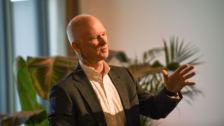In-house scoring the future of ESG
ESG investing and everything that comes with it have grown in both popularity and importance in recent years. Accelerated by surging engagement from consumers and investors around the world, the demand for transparent, consistent and true-to-label ESG or sustainable investment strategies has never been greater.
Yet as outlined in several recent events, but most particularly Russia’s invasion of Ukraine, geopolitical risks have exposed some of the inconsistencies in ESG-focused investing. Specifically, there was clearly a mismatch between what the public expect from ESG managers and ratings, and what investment managers who were applying ESG to their approach thought was appropriate.
What this highlighted most of all, though, was the challenge of relying on external research agencies and ratings providers for what is truly a personal and highly specific assessment of thousands of individual companies. With a primary focus on Australian smaller and medium-sized companies, the team at Perennial Better Future, led by Head of ESG Emilie O’Neill, have had to blaze their own trail on the ESG ratings approach.
Very few, if any, major global ratings agencies cover many of the companies in which the Perennial Better Future Trust invests, which span everything from technology to medical research and renewable energy, which was forced the creation of its own approach.
Named ESG&E, the internal ratings approach, according to O’Neill, puts the onus back on the person who should know best about each company, the sector analyst in charge. The assessment approach seems not uncommon to the majority of similar investors, but with one stark difference; the biggest input into a company’s score is Engagement.
Every ESG score has a 40 per cent weighting to engagement, but specifically the experience and openness with which company management have engaged with Perennial’s team in the past. This includes everything from the ability and scope of management to answer ESG-related issues, their ability to respond quickly and also their willingness to change. Recent examples included the recent decision of both Telix Pharmaceuticals (ASX:TLX) and Spark New Zealand (ASX:SPK) to introduce greater gender diversity into leadership roles.
Filling out the ESG score is a 20 per cent allowance to Environmental, Social and Governance issues, also determined by the growing team of sector analysts, with the ultimate goal being to reduce the large disparity that tends to occur in sources of third-party scores. For instance, it is common for one research house to allocate more importance to environmental issues given their ease of measurement, whereas another may place more input onto social issues, offering nothing more than confusion for investors and managers alike.
The diverse range of strategies operated by Perennial and a long track record of investing across the market-cap spectrum, but also into companies which move from small to large cap, means its team is in a unique position to identify the ESG issues that are truly material. In the last 12 months this resulted in some 150 ESG-dedicated engagements with ASX-listed companies. This is reported regularly, with highlights in March including discussions on modern slavery with KMD Brands (ASX:KMD) and emission reporting with APM Human Services International (ASX:APM).











